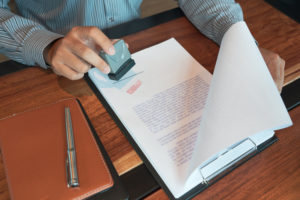Nowhere in the legal environment is the “notarizing” of documents more important than in the world of estate planning. In Florida, notaries provide a way to verify those who seek to represent an elderly person in Florida legal matters, and this reality impacts millions of elderly residents doing Florida estate planning. The Florida notary law update in 2020, was effective as of January 1, 2020. The new rules are a “game-changer” in many respects, and thus, everyone needs to be aware of these changes which are the focus of this week’s article.
The good news is that this update was enacted due to the prevalence of audio-video technology in the modern legal and business environments. The revisions have the potential to make the notarization process markedly less burdensome for Floridians in the process of preparing an estate plan—particularly those for whom mobility and transportation are not always easy. However, the not so good news is that this Florida notary law update just turned the notary laws on their head and the impact on documents already in place such as Florida powers of attorney AND healthcare directives in Florida is not yet fully known.
Florida Notary Law Changes in 2020
Most significantly, the Florida notary law update in 2020, beginning at Fla. Stat. §117.201, now authorizes notarization “by means of audio-video communication technology” (i.e., “online notarization”). Thus, Florida notaries may now perform notary services either in the traditional manner by witnessing a signature in the signer’s physical presence or via a video feed through a Remote Online Notarization (“RON”) service provider.
To complete an online notarization, the notary must be able—at the time of notarization—to see, hear, and communicate with the person whose signature is being notarized (the “principal”) and with any individuals witnessing the signature. Registered Florida online notaries can perform remote notarizations as long as the notary him or herself is physically situated within the State of Florida, even if the principal or any witnesses are located out-of-state at the time of signing.
New Standards for Online Notarization in Florida
For each online notarization, Florida notaries must create and maintain electronic journal entries. Each journal entry notes the date and time, names and addresses of principals and witnesses, information about the nature of the notarization, and evidence that the identities of all relevant persons have been appropriately verified. The signer’s identity and the identity of any witnesses can be verified based on the notary’s personal knowledge of the individual (if he or she is in fact personally known) or a government-issued form of identification confirmed through credential analysis.
Along with the journal entries, online notaries are required to make and retain an unedited recording of the audio-video communication during which the notarization occurred. At a minimum, the recording needs to show the appearance of the principal and any witnesses, confirmation of their identities, and the actual act of signing. The recording must also include a statement by the principal that the relevant signature is knowingly and willingly made, a description of what is being signed, and the notary’s statement at the beginning of the recording identifying the notarization being recorded. Technology used to record an online notarization must be “tamper-evident,” meaning that any later editing or alteration of the original recording is readily apparent.

Additional requirements apply if the instrument notarized via audio-video technology is an electronic will, testamentary trust, healthcare advance directive, or waiver of spousal rights. In those scenarios, a signing party must be asked and must answer whether he or she is under the influence of alcohol or drugs, has a condition or disability impairing normal activities of daily living, and requires assistance with daily care. If the answer to any of the questions is “yes,” witnesses of the signature must be physically present with the principal at the time of signing for the signature to be validly witnessed. Otherwise, witnessing via audio-video link is still only effective if the notary asks—and the principal answers sufficiently correctly—questions regarding the principal’s marital status, location, and assistance received with the video conference and relevant documents.
Subsequent to notarization, an online notary needs to take reasonable steps to ensure that the electronic records are appropriately backed up and kept secure, including password protection. Upon the request of an authorized person—such as the qualified custodian of an electronic will or someone presented with a remotely notarized power of attorney—the notary must be prepared to make and present electronic copies of the relevant recording. Online notaries can charge up to $20.00 per transaction for providing copies of the electronic records, subject to a few exceptions.
If a notary is unable to produce a compliant recording of the online notarization of an electronic will, the will is treated the same as a traditional will that has been lost or stolen.
Recordings of online notarizations and the notary’s electronic journal must both be saved for at least ten years after the date of the notarization. A notary or the notary’s agent can, though, delegate the data-preservation duties to a qualified repository if the Department of State is provided with notice of the delegation.
Before performing online notarizations, a notary must first meet the additional statutory prerequisites required for registration with the Department of State as an “online notary.” In addition to existing notary requirements, online notaries must be insured under a policy covering errors and omissions with minimum coverage limits of $25,000, bonded in the amount of at least $25,000, and undergo two hours training on the duties, obligations, and technology requirements for online notarization.
The Florida notary law update in 2020 expressly empowers the Florida Department of State to adopt additional rules and standards for notarizations that occur through audio-video technology, including standards for identity verification and secure preservation of electronic records.
Florida Notary Block Changes in 2020
Florida’s notary laws have also been revised to update the notary block required within every notarized document so as to reflect the new audio-video option. Along with stating the date and location of execution and identifying the signing party, the mandated notary block now includes boxes for the notary to indicate whether he or she witnessed the signing while in the physical presence of the principal or through online notarization. The change applies to the notary blocks required for all affidavits, instruments, and other documents acknowledged or subscribed under oath or affirmation before a notary—regardless of whether notarization occurs in person or via video feed. The “short-form” recommended notary block has been revised in accordance with the changes and is included within the text of the updated statute.
Importantly, the new notary blocks are mandated for any notarized documents executed after December 31, 2019. County clerks managing recordation of land records are likely to reject instruments submitted for recording using the old, now non-compliant notary blocks. A document signed before January 1, 2020, and including the old notary block can still be accepted for filing.
Steve Gibbs, Esq.



This update notary law is very essential
I was defrauded by a notary in Marion county fl in Dec 6,2018 and lost part of my cement slab at property beginning location which $2000. was charged for pad to gain right of occupancy in 1995. The Notary in this case Swore Under Oath that my husband presented Fl D L as identification but he did not and notary sent me an e-mail after the close of business day to not forget to send her a copy of my husband’s Fl D L so paperwork could be legal can I sue the Notary and her employer for damages??? As I lost property easement that has been owned since 1995 being cement slab.
Hello Letha, that sounds like a diffcult situation, and you would need to speak with a commerical litigation (possibly a real estate litigation) attorney about it to get the best advice.
Best, Steve Gibbs, Esq.
You must log in to post a comment. Log in now.